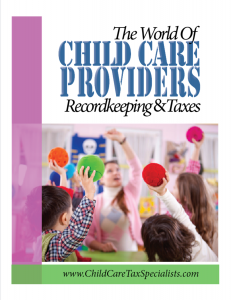 THE SEVEN RULES OF GOOD RECORDKEEPING
THE SEVEN RULES OF GOOD RECORDKEEPING
I. Track income from each parent and the Child and Adult care Food Program.
II. Save the receipts for all business and personal purchases.
III. Mark what each item is on the receipt.
IV. Organize receipts by category, not month.
V. Keep track of how much time – each week – you use your home for business.
VI. Conduct a regular review (at least monthly) of your records.
VII. After filing your tax return, keep your records in a safe place for at least 7 years.
Use our e-book *Recordkeeping and Taxes* to help give you ideas. What little time you have for administrative tasks needs to be as efficient as possible. That means getting filing done, setting up new files, and keeping mileage logs up to date. Receipts, don’t forget receipts. File them by subject.
For more than 30 years R. Patrick Michael has been preparing tax returns for individuals, small businesses, cottage industries and in-home child care providers. Pat is a recognized child care provider tax expert, and has been providing educational seminars for child care providers in San Diego County for the YMCA Child Resource Services for more than 18 years. Pat and his team have built a following that is comprised of long-term clients, new relationships and word-of-mouth referrals. Child Care Tax Specialists take care of their clients year-round with tax preparation, business entity creation and support, as well as tax planning for retirement, and estate planning.
IRS FORMS Exclusive Use Rule POLICIES & PROCEDURES Checklists, Mail & Mileage Logs IMPORTANT TAX DATES Articles & Books GLOSSARY OF TERMS Childcare Provider BLOG US-TaxLaws.com BLOG Crime Prevention and Emergency Handbook
Home Fire Safety Self-Inspection Checklist TAX INTERVIEW CHECKLIST
Child care provider medical safety checklist Provider Meal and Snack Log
The Baby Name Wizard, CHILD CARE GUIDE on RECORDKEEPING and TAXES
